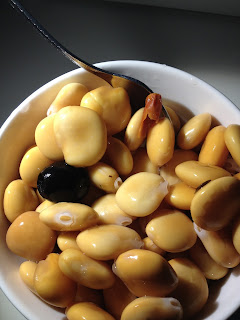A while ago, I bought some lupini beans out of curiosity. I had never eaten them before, but figured that they wouldn't be so different from other large, pale beans- I'd cook them in tomato sauce or the like. But after boiling them, I found myself corrected- they were bitter as Hell and very firm, too. No matter how long I boiled them, they wouldn't get soft or lose that bitter taste.
So, I turned to the internet. I was surprised to learn that this ancient bean beloved by the Romans centuries back has an issue with alkaloids- bitter, toxic compounds that make the bean inedible without proper preparation. Considering that I now had a kilogram of boiled, uneatable beans, I was very eager to know what I had to do to make them taste good. The general theme of the many guides that I saw was to gradually draw the alkaloids out by repeatedly soaking the boiled beans in water over the course of about a week.
So, I did. I changed the water 5 or 6 times a day, rinsing the beans thoroughly in between, keeping refrigerated at night. On the sixth day, the beans seemed just about ready, but I boiled them one more time to make sure. I then soaked them in salted water (about 2-3 TBSP for the kilo of beans) and topped them with a broken-up dried red chili, a spoonful of oregano flakes, and a jar of black olives. I refrigerated the whole lot overnight and, in the morning, found my efforts finally rewarded.
At first, they didn't seem like much. But they really are addictive- popping them into your mouth out of their tough skins is oddly satisfying (though I like them skins and all), and they have a subtle flavour unlike any other bean that goes very well with the olive brine and pepper. They also have a fantastic firm texture despite the days of boiling and soaking.
Lupini beans are high in protein and fibre, to boot. It makes them a pretty ideal snack, and though they can often be purchased ready in jars, I find that the home-prepared ones are slightly better since they don't need an acidity regulator. Try them yourself- there isn't much active work involved, just rinsing and draining, and the reward is delicious and nutritious.
How to Prepare Lupini Beans
1. Soak overnight.
2. Boil until tender but firm, about 45 minutes.
3. Drain and cover with water.
4. Change water 4-5 times a day for 5-6 days, or until all bitterness is gone. In between water changes, rinse beans for about 30 seconds at a time in a colander.
5. Give one last quick boil of about 15 minutes. Drain and cover with water that's salted to taste, and any other desired flavourings:
- A jar of olives added to the brine
- A couple of spoons of red chili flakes, dried oregano, or other herbs and seasonings


No comments:
Post a Comment